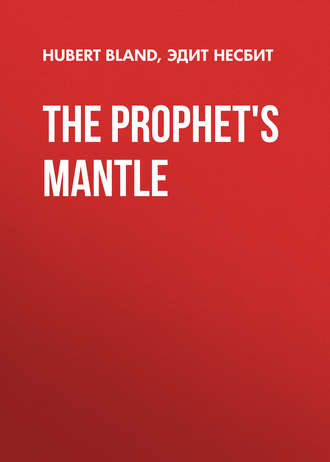
Эдит Несбит
The Prophet's Mantle
CHAPTER XXXII.
'HAND IN HAND.'
'Cannon Street Hotel, 9.30 p.m.
DEAR MR PETROVITCH,—We were married this morning at St Nicholas Cole Abbey, and we are leaving London by the night mail. I cannot go without thanking you with my whole heart for all you have done for me—for both of us. No words can ever tell you how much I feel what we owe to you. My husband says he owes more to you than I do, but I cannot think that. Good-bye until we see you in Russia. Oh! Heaven bless you, Mr Petrovitch, for all you have done for us.—Yours always gratefully,
Alice Litvinoff.'
In the same envelope was a letter from Alice's husband, and it did not begin in the same way as hers. It ran thus,—
'My dear Litvinoff,—I can't write to you under any but your own name, nor can I sign any other than my own. I kept yours as you wished, and Alice believes herself to be Countess Litvinoff. I shall tell her all that part of my story later, but I shall never tell her of my villainous and insensate desire for a rich wife, and for a life of ease which would have driven me mad in three months. Alice and a life of adventure are worth all the broad acres in creation. Nor shall I tell her that I knew her father. One thing more I must ask you to do for me. Write to Richard Ferrier and let him know that we are married. I think I've used him rather badly. Alice wishes you to say good-bye for her to her good friends Mr and Mrs Toomey. Some kind fate certainly kept watch over my wife while I was playing the fool and dangling after another woman. And Fate has been a thousand times better to me than I deserve. With my dear wife, and the prospect of meeting you soon in Russia, I feel all the old enthusiasm re-awakening. Vive la Révolution!—Your old secretary and friend,
Armand Percival.
'In signing that name I feel as though I were writing with my left hand, it is so awkward to me after all these years.'
Petrovitch sighed as he replaced the letters in their envelope. He had given himself up wholly to the cause he served, and he had suffered for it, and was prepared to suffer more, and generally he was contented, even glad, that it should be so. But sometimes a sudden sense of the utter loneliness of his life came over him, saddening and oppressing him. Then he seemed to himself to be not a man with a life of his own to live and hopes of his own to cherish, but a power passing through the lives of others, helping, guiding, saving, and always after a while fading out of those lives. He had brought these two together, and they were all in all to each other, and he was much to them perhaps, but mainly because he had brought them together. Now he felt that they were lost to him, and he had loved them both—Alice with the love of a strong man for a child, and the other with a deep attachment which dated from the first moment of their meeting, and which had unaccountably withstood all the other's shortcomings. Unaccountably? No? the essence of love is its boundless capacity for pardon; the unaccountable part of it was that he should ever have loved him at all. And they were gone; and gone, as Petrovitch knew well enough, to begin a life whose end, sooner or later, must be the scaffold or the death-in-life of perpetual imprisonment. He had led many a man and many a woman into that path, knowing all that it meant, and he was not sorry. Was it not the path he had himself chosen as being the noblest that any man's feet could tread—the path of utter self-renunciation? But though he was never sorry he was often sad, and sadder than usual on the day when his two friends bade farewell to safety and English soil. He felt lonely and desolate. But Michael Petrovitch never felt his own moral pulse for more than half a minute at a time. He sighed, raised his hand to his chin, and smiled at finding himself reminded that the gesture of passing his hand over his beard, which had grown into a settled habit with him in moments of annoyance or excitement, was no longer possible.
He turned to his table and wrote half-a-dozen letters. There were many arrangements still to make for his journey. Then he rose, put on his hat, and started for Marlborough Villa.
He had not cared to face that dinner where he was to have met his fellow revolutionist. He had written a hasty note of excuse, and had spent the evening and the best part of the night in conference with his morose friend Hirsch, who was a little more morose even than usual on this occasion, owing to what he thought the absurd and unjust leniency with which the pseudo Litvinoff had been treated. He would have been much better satisfied had some sudden and awful judgment overtaken the adventurer who had dared to personate his hero—even had that judgment come in the form of a trial for forgery at the Old Bailey; which fact showed that he was but a weaker brother in the faith that teaches that crime is a disease to be cured, not an offence to be punished. In that conversation with Hirsch the date of Petrovitch's departure had been finally settled, and now he had a few farewell visits to pay. One must certainly be to Mrs Quaid—he had a fancy that he would try to make his parting with Miss Stanley something more than it could be in the presence of that estimable lady. He thought that Clare would not hesitate to say good-bye to him without her hostess's surveillance. At any rate, a chance of being alone with her to say his farewell was what he was bent on trying for. At Marlborough Villa he was shown into the morning-room. It was empty, but in a moment Clare came in.
He was standing with his back to the window. When she saw him she started visibly, and, with an unmistakable gesture of annoyance, was turning to leave the room, when he made a step forward, and she paused and looked at him, and, turning with a complete change of expression, held out her hand.
'How could I have been so absurd?' she said. 'Do you know for the moment I really thought it was Count Litvinoff.'
'I don't wonder at your not quite recognising me. You see I had to sacrifice my beard. I am going back to Russia next week. Disguise will be de rigeur, and beards and disguises are incompatible.'
'Going back to Russia next week?' she repeated slowly, 'and I had so much to say—to ask—'
'Do you still need advice?' he said, smiling.
'Yes,' she said, speaking quickly and eagerly, 'more than ever, for now I have made up my mind. I am quite certain that my money ought to go—not to simply alleviating the miseries that wring one's heart, but to helping to overthrow the system that causes them. I have felt it a strong temptation to help first the individual sorrows that I know of; but I know that the right thing to do is to help not those, but the revolution that will render them impossible. I am right, am I not?'
'Yes,' he answered. They were standing by the window. This was not the sort of thing that one settles comfortably into chairs to 'talk over.'
'But now you are going,' she said, with a saddened falling cadence in her voice, that made music for the man at her side, 'and I shall have no one to tell me what to do. Why need you go? Is there nothing for you to do here? Is Russia so dear that it pushes all other claims out of sight?'
'It is not that I am a patriot. I love Russia, I love my people, but I love England and her people too. But better than either do I love Liberty, and I must be where her enemies are strongest, where the battle is hottest.'
'If that is so,' she said, reflectively, with her eyes downcast, 'everyone who loves Liberty best should be in front of the battle too?'
'I think so; but each must think for himself,' he was beginning, when they both turned at the sudden opening of the door. Cora Quaid came in; her fresh face quite pale; a newspaper in her hands.
'Oh, how do you do, Mr Petrovitch. I did not know you were here. Clare, such a terrible thing has happened, dear; mamma has just seen it in the paper.' She held out the sheet and pointed to a paragraph headed, 'Shocking accident at Firth Vale.'
The paragraph told briefly of the death of Richard Ferrier, and of the discovery of Hatfield's body in the great tank, and concluded thus: 'The brother of the deceased, Mr Richard Ferrier, states that his brother went out for a stroll on the previous night in his usual spirits. There is no clue to any explanation of the catastrophe, save that the man Hatfield was formerly employed in this mill, and had been heard to say that he considered himself personally aggrieved at the closing of it. He was supposed to be in the south of England, and it is rumoured that he secretly returned to wreak vengeance on the young masters of the mill for the part they had taken in closing it.'
Clare read it through; her face grew white, and she passed it to Petrovitch. He read it silently, his brow contracting. When he laid the paper down he looked at Clare. She had sunk into a chair, her arms stretched out over her knees to their full length, and her hands clasped.
'Poor fellow! poor Dick!' she said; 'but, oh, Cora! poor Mrs Hatfield! How will she bear it? Oh! how cruel life is to some people. First her daughter, and now her husband, and she is alone in some strange place, where no one can get to her to help her to bear it!'
'How could you help her if you knew where she was?' asked Petrovitch.
'I could tell her myself. I have had grief to bear—I know,' she answered. 'I would save her from hearing it from some careless stranger. I could go to her—'
She broke off. Her hazel eyes were full of tears.
Cora laid her hand on her friend's shoulder with a sympathetic touch.
'I happen to know where this Mrs Hatfield is,' said Petrovitch, reflectively, 'and I agree with you, Miss Stanley, that it would be right for you to go to her.'
Clare rose instantly. As she did so the tears brimmed over, and two fell from her long lashes.
'I will go now,' she said, 'if you will tell me where she is.'
'I will take you to her now, if you like,' said Petrovitch.
Cora looked at him a little curiously.
'We had better speak to mamma, I think,' she said; 'perhaps we can come with you, Clare.'
The two girls left the room, and Petrovitch, for once, did not take up a book, but stood rapt in thought through the ten minutes that passed before the door opened again.
Clare came in alone. She was still dressed in black, of course, and had a little close crape bonnet that seemed to enhance the prettiness of the face it framed.
'I am quite ready,' she said. 'Mrs Quaid and Cora cannot come. They have some people coming to lunch, and I am not sorry, for poor Mrs Hatfield ought not to be bothered by strangers.'
'Come, then,' he said, and they went out together. As soon as they were outside he offered her his arm, as a matter of course, and she took it.
'How did you know her address?' asked Clare, as they walked along.
'Ah! that involves explanations,' he answered; 'to begin with, I must tell you that I met Count Litvinoff two days ago. It was from him I had Mrs Hatfield's address.'
'I remember he and poor Hatfield used to be friends.'
'He gave me the address for a special reason and for a special purpose. He has married Alice Hatfield, and he wished to let her people know.'
'Alice Hatfield! But—how long ago? How did he know her?'
'He married her yesterday, and they have gone to Servia together. Miss Stanley, it was with Count Litvinoff that Alice left her home.'
Clare held her peace for a moment. Her bewilderment would not let her find words. Then she went on, 'But he acted as though he believed Roland had taken her away. Oh, how could he have been so base and—'
'Do not judge him,' Petrovitch interrupted; 'no one knows how he may have been tempted, and he has repented and atoned for his fault in as far as he could.'
'There are some things that cannot be atoned for,' said Clare, compressing her lips. 'If it had not been for him this tragedy would never have happened. Oh, when I think—' She broke off suddenly.
'When you think that he would have married you, owing all to Alice Hatfield, you can find no words to speak of his baseness. Is it not so?'
She looked at him in mute inquiry. How did he know so much?
'Years ago,' he said, 'he and I were friends, and I love him still. He has told me much that has happened since last autumn. And I say, judge no man's actions, for of his temptations you cannot judge.'
Then they were both silent, and when Clare spoke again it was to inquire how the trains went, and so on.
'I wish you would tell me—' Clare began, when they were in the train en route for Dartford.
'There is much I would wish to tell you,' he interrupted, 'but not to-day, when you are going on an errand of kindness and mercy. You do not want to talk now, you want to think; and besides, I want to see you again. Will you write to me to-night, and tell me when and where I can see you alone to-morrow.'
'Yes, if you wish it,' she said. 'I had so much to ask you; and just now it seems as though I could think of nothing but that man, lying dead far north, and his poor wife here alone.'
'Then it is a promise. We are comrades, since we serve in the same ranks; and between comrades a special farewell is necessary. Now, we will not talk, since you do not desire it.'
Clare leaned back in her corner, and wondered how she should break the news to that poor widow.
But when they reached Earl's Terrace, and found out the house where she was, they found, too, that there was no need to break the news to her. She knew it already, as Clare saw in a moment. Petrovitch did not come in, and the two women met alone. What Clare said to her? It is beyond us to write that down; and if the words were set down here, despoiled of the tender tones, the eloquent gesture, the heart-warm tenderness of the young girl, who had herself felt grief, what would they be worth? In the presence of sorrow some women are inspired, but not with words that will bear reporting.
Mrs Hatfield's grief was not violent. She wept, but not bitterly.
'It is the Lord's will,' she said, and she believed her words. When she heard of her daughter's marriage she said simply, 'Thank God for a' His mercies! I doubt He's been ower good to we i' mony ways, an' we mun bear what He's pleased to lay upo' us.'
Clare would have been more at ease to have seen her weep freely, but she seemed crushed. This last blow had mercifully benumbed her senses. Not her gratitude, though, for when Clare rose to go she rose too, and, taking the girl's hands in hers, looked at her and said,—
'An' thee came a' th' way fro' Lunnon to help an old wife to bear her burdens. Eh! but thee'rt a bonnie lass, and as good as thee'rt comely. Thee'll be the light o' some honest lad's e'en some day, and may thee ha' as good a man as mine were.'
Clare kissed the faded face. She had not so kissed many faces. She put her young, round, soft arms round the woman's neck, and said 'Good-bye.'
'You'll see me again, or hear,' she said.
'There's some words as Alice were fond o' saying time agone, and I'll say 'em to thee, my lass, for I'll not see thee agen, m'appen, and they say my meanin' clearer nor talk o' mine. "The Lord bless thee and keep thee, the Lord make His face to shine upon thee and be gracious unto thee, the Lord lift up the light of His countenance upon thee, and give thee peace."'
Mrs Hatfield opened the gate for Clare to pass out. Petrovitch did not seem to see her, yet when Clare was on his arm again he said,—
'That woman is marked by Death. She will not live three months. Her heart is broken.'
It was. His words came true.
When the two were once more in the train Clare's silent mood had passed. She would gladly have talked, but the carriage was full, and her companion's place being on the opposite side of the carriage, anything but an occasional word was impossible.
She sat gazing out of the window, and he sat in the opposite corner looking at her fixedly. As they were passing over the bridge to the London terminus he leaned forward suddenly, and she, anticipating some words from his movement, withdrew her eyes from the sun-bathed, rippling river and fixed them on his. There she met such a look of passion, and love, and longing as she had never seen in any man's eyes before; and as she gazed, startled, spell-bound, his voice whispered these words, in a tone too low for any ears but hers, and yet distinct enough for every word to be plainly heard by her, and to make her heart bound responsively. Only these words,—
'Whatever happens, I shall always love you.'
Then he leaned back again. Clare drew a deep breath, and the train stopped at the Charing Cross platform.
No other word was said between them till he had called a cab and placed her in it. Then he said, 'Do not write to me: I will write to you.' He pressed her hand, drew back, and the cab was driven off.
As Petrovitch walked back to his lodgings the sky grew quickly cloudy. It seemed as though the sunshine had gone away with Clare Stanley. By the time he reached Osnaburgh Street the rain was beginning to fall in big heavy splashes on the dusty pavement. He strode up the stairs to his room, locked the door, and flung himself down in the elbow-chair by the fireless grate. The rising wind blew the rain in gusts against the uncurtained window, and the large drops chased each other down the panes and obscured the view of the high houses opposite. All the sweetness had gone out of the weather. Petrovitch noticed it, and felt glad that it was so. He sat quite still and quite silent, his elbow on the arm of his chair, and his forehead on his hand. Now indeed the dark hour was upon Saul. For six months his dream, his hope, his ambition had been to return to Russia. Now he was going at last, and the thought of it was maddening.
He had known that he loved Clare, but he had not known how much he loved her until that moment in the train, and then his sudden knowledge of the strength of his own passion had broken down all his resolutions.
How could he have been such a fool as ever to speak the words which made it impossible for him to see her again? He had not meant to speak them. He could not understand how he had come to speak them. Their utterance was the first unguarded action he had been guilty of for the last ten years. And he had thought with some reason that he could rely on his own cool-headedness and self-restraint. Now it seemed he was mistaken. He was as much the slave of impulse as another—as much as the man who had assumed his name.
It was incomprehensible to him. He quite failed to understand the full force of this new over-mastering emotion. Clare! Clare! The world seemed to mean nothing but Clare. He thought of her apart from all the other facts and circumstances of life, of herself, her face, her eyes, her hair, her voice, her way of holding her head, the movement of her hands when she spoke, and it was a rapture to think of her like this, and to let the thought of her rush over and sweep away all other thoughts, even of his own life's aim. Then slowly came back to him the remembrance of all the realities of his life, and he cursed what seemed to him his degradation. What sort of patriotism was it that the touch of a girl's hand could wither? What principles were they that the look in a girl's eyes could destroy? It was an utterly new experience for him, and he felt as though his patriotism and his faith were dead within him. In that hour he was man first, patriot after. But the hour of weakness was, after all, a brief one. His patriotism was not dead. It had been his master-passion too long for such an easy death to be possible, and as the dusk fell and deepened into night it rose up and met that other passion in the field and vanquished it.
It was late when he rose and lighted his lamp. It shone upon a face white with the struggle he had gone through, but set and determined. He turned to his table and wrote,—
'I love you! I told you so to-day. I did not mean to tell you, and I cannot account for or excuse the impulse that made me do so.
'But, having done so, I cannot ask you to meet me again as comrades meet. It would be embarrassing for you, and for me impossible. I know you do not love me. Perhaps you will even despise me when you learn what has been the temptation I have undergone. To give up Russia—the Cause—the Revolution—everything—and to stay at peace in England, and give my whole soul to the effort to win your love. I am glad to think I am not so unworthy of you as I should have been had I yielded to this—the strongest temptation of my life. I shall leave London to-morrow morning; I cannot stay so near you without seeing you.
'You will think me ungenerous in leaving you without any advice on the subject you desire to be advised on. You shall hear from me before long. Perhaps when I am further from you I shall be better able to write you the sort of letter you will care to have from me. For those who love Liberty, life is made up of renunciations, but no renunciation could be so difficult, so bitter, as is to me the renouncing of this least faint ghost of a chance of winning you.
Michael.'
He went out and posted the letter, and when he came in again did not indulge in any more reflections. He busied himself with packing up his belongings, paying his rent, and making all his arrangements for leaving London the next morning.
But when the next morning came, with a fresh radiance of blue skies and sunlight, all his plans were overturned, all his thought unsettled, by this telegram,
'Clare Stanley, Marlborough Villa, N.W., to Michael Petrovitch, 37, Osnaburgh Street, N.W.—You are not going without good-bye. Please be in the Guildhall at twelve.'
Most men in his position would have been there at eleven at the latest. But the clock was on the first stroke of twelve as he walked through the crowd of fat pigeons, who, as usual, were busily eating more than was good for them in the Guildhall yard. He passed through the arched entrance and stood in the doorway. No one would have guessed by his face that he was keeping an appointment made by the woman he loved. He looked white and haggard, wretched and weary. His glance travelled round the large hall. In front of the statue of the Earl of Chatham stood the graceful black figure he looked for.
He walked across to her. As his footsteps sounded on the stone floor she turned her head, but did not move to meet him. When he was quite close to her she held out her hand in silence. He took it, pressed it, and let it fall at once. He spoke almost sternly.
'Why did you bring me here? I told you it was impossible for us to meet on the old terms.'
'I asked you to meet me here,' she said, 'because I had to come into the City on money affairs; and for the other, I have not asked you to do the impossible.'
She, too, was very pale, and spoke with what seemed like an effort at lightness.
'It is unworthy of you,' he went on, hardly noticing her answer, 'to make my renunciation so much harder for me.'
'There are enough inevitable renunciations in life for us without our making others by misunderstandings,' she said, her eyelids downcast.
He looked at her silently, as a man might in a dream which he feared to break by a word. At last he spoke, in a very low voice, with his eyes still on her face.
'This is glory to know,' he said, 'but do you think it makes the sacrifice more easy? Before it was only a chance I gave up—now it is your very self I must renounce.'
'Why?' Her voice trembled a little now.
'Because I must return to Russia. My place is there, and where I go—'
'I, too, will go,' she interrupted.
He caught her wrist.
'But if you go with me you go to almost certain death.
'Does that matter?' she said, and looked full in his eyes.
His fingers had closed on hers, and so they went out together into the bright English sunshine. Not more serenely, not more gladly, than they would hereafter go, hand in hand, into the black darkness and oblivion that waits to swallow those who dare to set themselves against the bitter tyranny of Russia.
To each of them that day had given the most perfect gift of life, and both were content to offer up that gift—life itself even—for the sake of the Liberty they loved—the Liberty who, though she may not crown their lives—will consecrate their graves.






